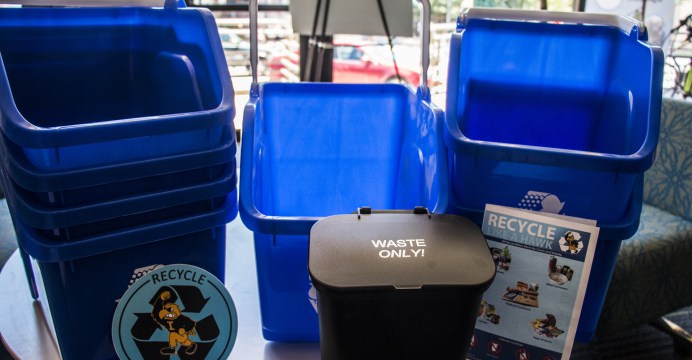College of Liberal Arts & Sciences
Daily Iowan: UI Earns Grant for 500 Recycling Bins

As recipients of a grant from Coca-Cola and Keep America Beautiful, the Office of Sustainability will distribute the bins around campus to increase recycling potential.
The UI Office of Sustainability will distribute 500 new recycling bins around campus thanks to the Public Space Recycling Bin grant from Coca-Cola North America and the organization Keep America Beautiful.
“At the end of the day, we want our bottles and cans back,” said Sarah Dearman, the sustainable packaging program director for Coca-Cola North America.
The company has a goal to reuse 100 percent of its packaging by 2030, she said, and it commonly uses recycled content to reduce its carbon footprint.
Since 2007, Coca-Cola and Keep America Beautiful have granted more than 1 million recycling bins to public spaces around the country. Coca-Cola granted 300 to the UI in 2007.
As a condition of the grant, the office will distribute a “tiny trash” bin with each recycling bin, a standard already common around the university. Research by Keep America Beautiful has deemed tiny trash bins an effective way to increase office recycling.
The trash bins are significantly smaller than the recycling bins and clip onto the larger bins’ sides to encourage users to recycle more and throw away less.
Beth MacKenzie, the UI Office of Sustainability’s recycling coordinator, points to the Center for Disabilities and Development as a great example in the university. In the first seven months after receiving tiny trash bins, the center upped recycling from 32 to 42 percent of its total waste.
So far, the Sustainability Office has distributed 100 bins to the State Hygienic Lab, in Coralville, much to the excitement of building coordinator and security officer Bill Berger.
“We’ve got a very pro-recycling staff here,” he said, because the environment is at the forefront of the lab’s mission.
The lab’s custodial staff distributed the bins overnight last week while Berger retagged the “slim jims” where staff bring their garbage and updated signs around the building. He also sent emails to let the staff know about the change.
“I think it just brings a refreshed awareness,” he said.
When the lab’s staff arrived that morning, there were fliers on their desks with information about recyclable materials. MacKenzie manned an information table in the break room to answer any questions.
The Seamans Center is a likely next candidate for bin distribution, MacKenzie said. Though the new annex has new recycling and tiny trash bins, as the university requires for new buildings, the rest of the building needs an update.
“Five hundred recycling bins might seem like a lot, but there are a lot more desks and work stations on campus,” she said.
The garbage cans that the new recycling bins replace will go to a storage facility, MacKenzie said. They may be repurposed as recycling bins later if grants cannot keep up with demand. In the past, the office has updated large garbage cans with “Recycle like a Hawk” stickers and attached tiny trash bins to them.
The recycling effort is in line with the Sustainability Office’s goal to divert 60 percent of university waste from the landfill by 2020.
“I think continuing to expand tiny trash on campus is one of the ways that we’ll get there,” MacKenzie said.
By Julia Poska